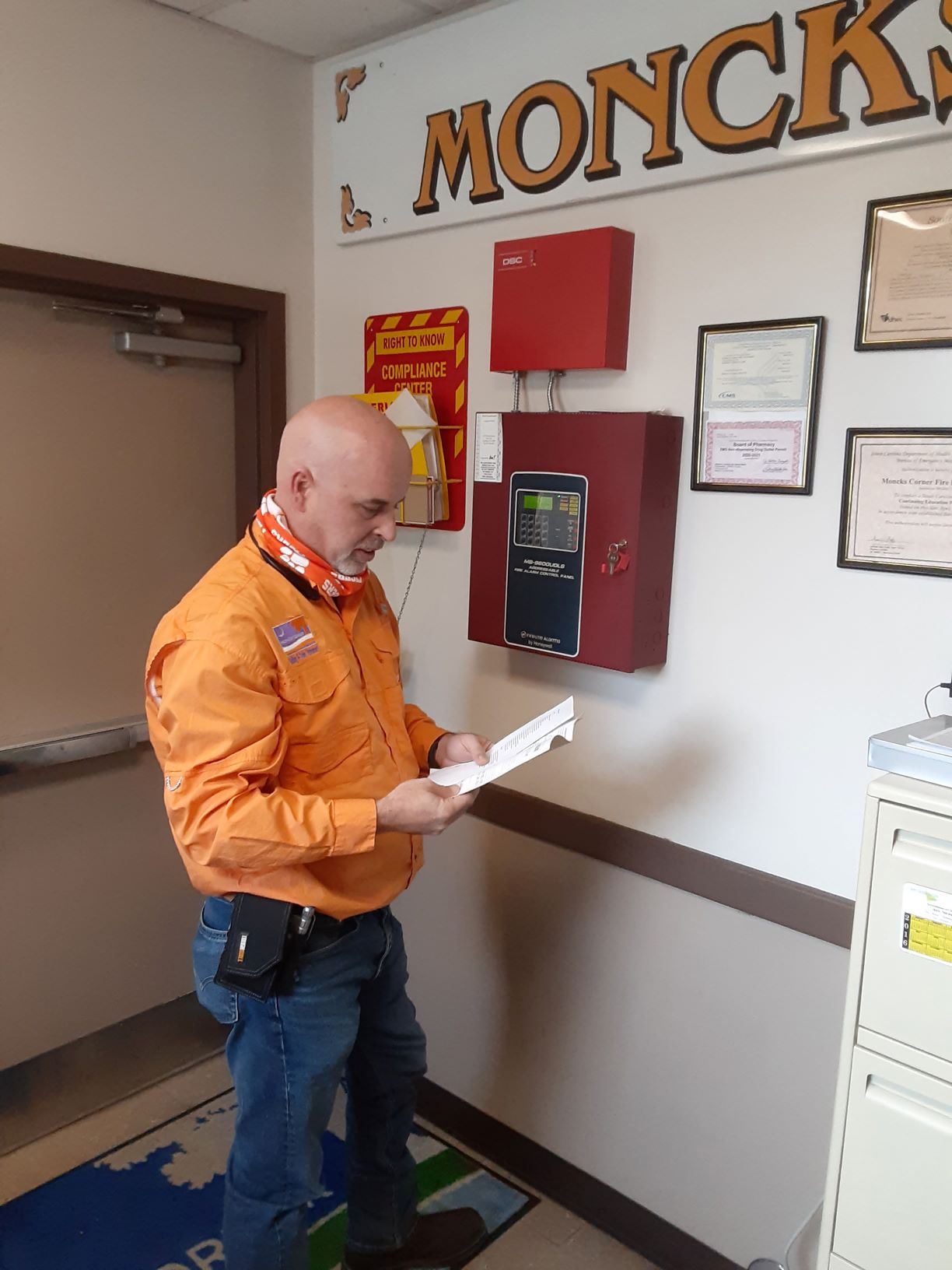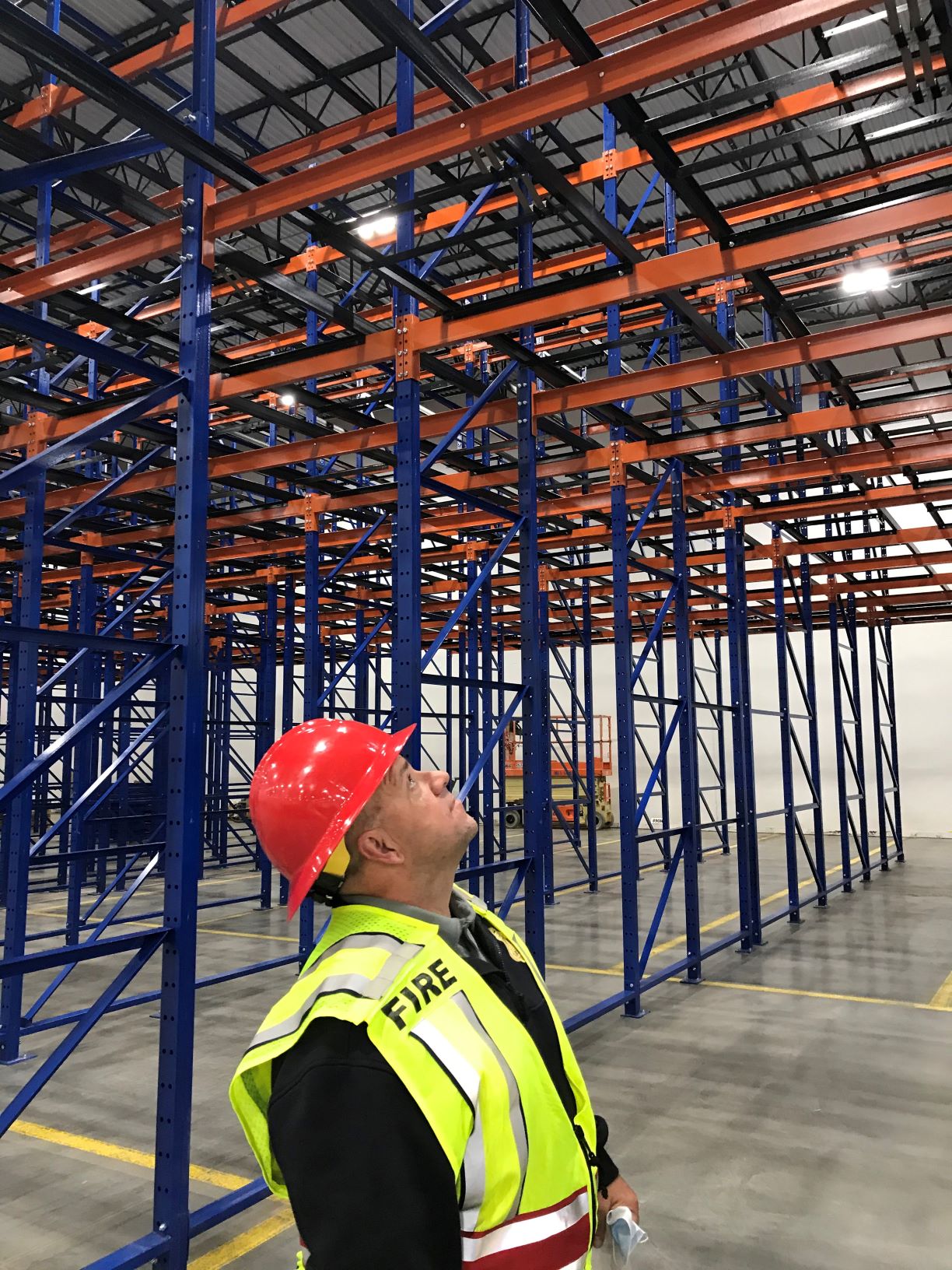Keeping buildings and business owners, their employees and customers safe is the goal of South Carolina’s municipal fire marshals. A key element to their jobs is helping business owners understand what the fire codes are and why they are necessary. Larger cities, or those experiencing growth, have found they need multiple inspectors to keep up with annual inspections of existing buildings and plan reviews and inspections for new construction.
In Moncks Corner, the city has two fire inspectors in addition to Chief Building Official/Fire Marshal Chad Kelly, who also is responsible for making sure new structures meet the requirements of building codes, stormwater and floodplain regulations as well the fire code. The team shares the responsibility for inspecting about 1,000 buildings each year and reviewing plans and inspecting for new commercial construction projects.

Chad Kelly is the chief building official and fire marshal for the Town of Moncks Corner.
Photo: Town of Moncks Corner.
“With new construction, it starts at plan review. Throughout the process, we conduct various inspections, to make sure that everything is installed properly,” Kelly said. “We’re probably out there 20 to 30 times on various inspections and that’s not just fire, that’s building codes also. But we’re looking at everything while we’re out there to make sure there are no issues that may come up.”
Kelly’s office coordinates sprinkler plan reviews through the state fire marshal’s office.
“They have fire protection engineers on staff and they are very quick” with plan reviews, he added.
Kelly has been in code enforcement for more than 20 years. He also teaches a fire inspector class through SC State Fire, a division of the SC Department of Labor, Licensing and Regulation that includes the state fire marshal’s office and the South Carolina Fire Academy.
For existing buildings in Moncks Corner, Kelly and his team make a plan to inspect every building each year. Annual inspections are important to make sure buildings keep fire extinguishers up to date, exit signs lit and exits clear of obstacles. Kelly also said that alterations that occur when the way a building is used changes, such as putting in or taking out walls or other structural renovations, can lead to increased hazards in a fire.
“We have a route for the fire inspections that starts over every October 1 that gets us completely through town,” Kelly said. “We work in geographic areas as we go through — sometimes it’s who’s available, but most of the time we have somebody assigned to each area.”
Education is critical for keeping the inspections on schedule, Kelly said. The more businesses adhere to the regulations, the less need there is for reinspections.
“Once a year, we go through every business and we educate the people on what we found and what the correction is,” Kelly said. “Hopefully the next year you don’t have those same violations in the same places.”
Education outreach, and giving businesses the time they need to make fixes, helps to make fire marshal work run smoothly for Greer Fire Department Deputy Chief of Administration Scott Keeley.
“Our biggest thing is we try to focus on the education side of it,” Keeley said. “If we write a citation for court, it’s usually for illegal burning in the city. Very seldom do we have to take someone to court for a fire code violation.”
That approach leads to less pushback from building owners, and fewer violations means fewer reinspections.

Greer Fire Department Deputy Chief of Administration Scott Keeley performs an inspection.
Photo: City of Greer.
“We don’t see a lot of repeat violations. While we can and do write citations, our biggest goal is to educate the business owners and the tenants in those buildings as to why they need to have current fire extinguishers or why they shouldn’t be using drop cords in place of permanent wiring,” Keeley said. “If you educate them and tell them why, they seem to be more compliant and realize that you’re there to help them stay in business. It’s really worked well instead of just going in and trying to rule with an iron fist.”
Keeley has two deputy fire marshals, but with more than 2,000 structures to inspect and new construction booming, his team averages about 18 months to get through all routine inspections.
“One thing I am doing as kind of a ‘checks and balances’ is to flip-flop on the reinspections: Inspector A is going to do Inspector B’s reinspections. That way, it gives another set of eyes in there, too,” Keeley said.
Greer’s fire inspection team has worked out of city hall since 2008, helping streamline the inspections process for new construction.
“Basically for everybody who deals with new construction, it’s almost like a one-stop shop,” Keeley said. “We’ve got planning, zoning, stormwater, building department everybody’s down here … It’s more customer friendly.”
Keeley said a new software program the city began using puts all new construction into one system for permitting and inspections, and allows the whole team to see where projects are in the workflow. Keeley said contractors tell them they appreciate the city’s efforts to coordinate inspections so work has to stop just one time, rather than three or four times for each inspector.
In Walterboro, the city uses an outside contractor for building inspections, which makes it easy for Fire Marshal Chris Crosby to coordinate new construction inspections. His career has included stints as a finance office manager, a police officer and firefighter before he took his current role.
“When a construction team comes in, we generally have a construction meeting before everything gets started and we actually sit at a round table and we all talk and hash out any problems we foresee coming up,” Crosby said.

Chris Crosby serves as fire marshal in the City of Walterboro. Photo: City of Walterboro.
His office also uses an inspection reporting software that is the same as used on U.S. military bases. That software allows him — as an office of one — to do about 1,200 inspections a year.
On his existing building inspections, Crosby said he sometimes will do as many as 10 in a day, but the program he uses means he can email the business a report within a few minutes of completing his inspection.
Like other fire code enforcement officers, Crosby said helping to educate the building tenant or owner on the front end helps get issues fixed with little fuss.
"Usually when you give somebody a reason, you get the buy-in and they understand,” he said. “But if you just tell them it’s because you’re the big bad fire marshal, you’re automatically going to get kickback from them.”
As with other fire marshals in the state, Crosby said that education efforts have a real effect. He said he has never had to go to court with a building owner over a fire inspection issue.
